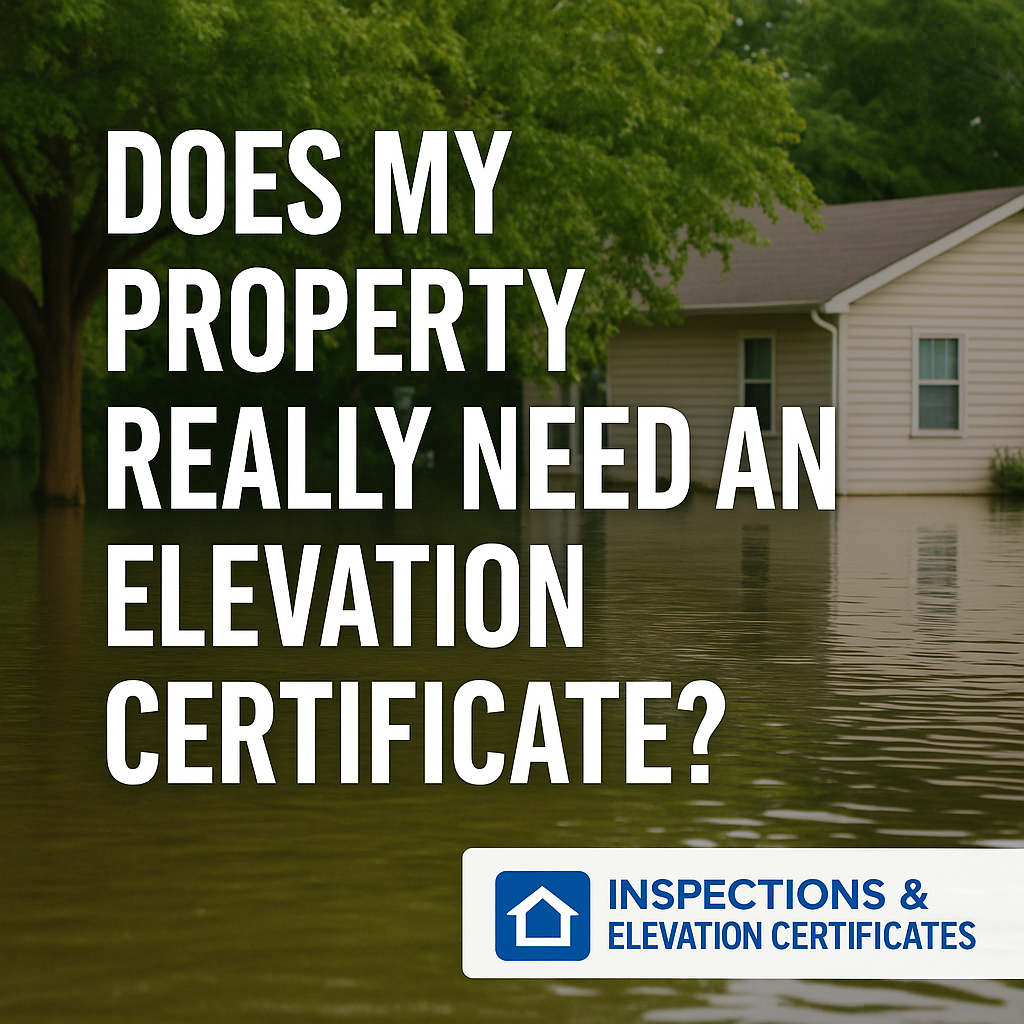Does My Property Really Need an Elevation Certificate?
Full Guide for Flood Insurance & Construction Permits in Florida**
When buying a home, renewing insurance, or planning construction in Florida, one question constantly comes up:
“Do I really need an Elevation Certificate for my property?”
With FEMA flood maps changing, stricter guidelines from insurance carriers, and more cities enforcing documentation for new permits, understanding when an Elevation Certificate (EC) is required has never been more important. As Florida’s trusted statewide provider of Elevation Certificates, land surveying, and engineering inspections, Inspections & Elevation Certificates / My Florida Pros Network prepared this simple but comprehensive guide to help homeowners, buyers, and realtors avoid delays and unexpected costs.
What Is an Elevation Certificate?
A FEMA Elevation Certificate is a formal document created by a licensed land surveyor, engineer, or architect that provides verified elevation data for your structure.
It includes:
-
Base Flood Elevation (BFE)
-
Floor elevations (finished floor, top of slab, machinery/equipment)
-
Flood zone information
-
Building diagrams
-
Photographs
-
Datum and benchmark data
-
Surveyor/Engineer certification
Insurance companies and building departments rely on this document to understand the flood risk and determine compliance with local and federal regulations.
When Do You NEED an Elevation Certificate?
Below are the main situations where an EC is required or strongly recommended in Florida.
1. When Purchasing Flood Insurance (NFIP or Private Market)
If your structure is located in a Special Flood Hazard Area (SFHA) — usually A, AE, AH, AO, V, VE — an Elevation Certificate is often required for accurate insurance rating.
Insurance carriers may require an EC when:
-
Your home is in a FEMA high-risk flood zone
-
You are renewing an older flood policy
-
The property was built before the 1980s and no EC exists
-
You are requesting a better/lower rate
-
Your insurer wants elevation confirmation to avoid mis-rating
A current EC can lower premiums by proving your home is elevated higher than assumed, especially in Miami-Dade, Broward, Palm Beach, Brevard, Collier, Lee, Pinellas, and Monroe County.
2. When Pulling Construction or Remodel Permits
Many building departments require an Elevation Certificate before approving:
-
New construction
-
Additions
-
Major remodels
-
Enclosures
-
Repairs after substantial damage
-
Lifts, foundation work, or structural improvements
If your project is in a flood zone, the city must verify that your finished floor elevations and floodproofing meet Florida Building Code (FBC) and FEMA regulations.
Examples of common Florida jurisdictions requiring ECs:
-
Miami-Dade Building Department
-
Broward County
-
City of Fort Lauderdale
-
West Palm Beach
-
Port St. Lucie
-
Jacksonville
-
Naples & Collier County
-
Tampa/Hillsborough County
-
Sarasota & Manatee
-
Brevard County
-
Monroe County (strictest flood regulations in the state)
3. When Requesting a FEMA LOMA or Map Amendment
If you are challenging your flood zone classification with FEMA, you must provide an EC to support your Letter of Map Amendment (LOMA) request.
This is very common in:
-
Miami
-
Fort Lauderdale
-
Boca Raton
-
Naples
-
Port St. Lucie
-
Orlando suburbs
-
Panhandle coastal communities
An accurate EC can remove your home from a mandatory flood zone and eliminate the requirement for flood insurance.
4. When Selling a Home in a Flood Zone
Sellers who provide a current Elevation Certificate build instant buyer confidence.
Realtors prefer having an EC upfront because it:
-
Speeds up underwriting
-
Reduces last-minute insurance delays
-
Helps buyers forecast future premiums
-
Avoids surprises at closing
Homes with updated ECs are easier to insure, especially for FHA and VA buyers.
5. When Your Previous Elevation Certificate Is Outdated
FEMA recommends updating ECs if:
-
Your certificate is older than 5–7 years
-
Flood maps in your county were updated
-
Improvements were added to the home
-
The foundation, floor height, or equipment was changed
Many Florida counties have had recent map updates, including:
Brevard, Broward, Miami-Dade, St. Johns, Escambia, Sarasota, Collier, and Lee County.
When You Do NOT Need an Elevation Certificate
Not every property needs one. You generally do NOT need an EC if:
-
You do not carry flood insurance
-
Your home is in a low-risk flood zone (X)
-
You do not plan to pull construction permits
-
You already have an updated EC with no structural changes
However—many “Zone X” properties STILL get ECs to prove elevation for lower private-market premiums, especially on the east and west coasts.
Benefits of Having an Elevation Certificate (Even When Not Required)
Even if not mandatory, homeowners gain major advantages:
✔ Lower flood insurance premiums
✔ Better resale value
✔ Verified data to support future permitting
✔ Accurate elevation and flood risk information
✔ Documentation for lenders and insurance underwriting
For investors, builders, and waterfront homeowners, this document is critical for due diligence.
How Our Team Provides Elevation Certificates Anywhere in Florida
Inspections & Elevation Certificates / My Florida Pros Network offers statewide same-day and next-day EC service, backed by:
-
Licensed PSM surveyors
-
Licensed engineers
-
FAA commercial pilot/inspector Roger Morales
-
Rapid deployment via Mooney M20J, and Grand Caravan
-
GNSS, GPS, and advanced elevation equipment
-
Accurate benchmarks & FEMA-compliant diagrams
We service all 67 Florida counties, coastal and inland.
Call 877-894-8001
Email: roger@inspectionsandengineering.com
Conclusion: Do You Need an Elevation Certificate?
If your Florida home is in or near a flood zone, if you are buying insurance, pulling permits, constructing a new addition, or planning to challenge your flood zone—then yes, you likely need an Elevation Certificate.
Our team can guide you step-by-step and deliver fast, accurate, FEMA-compliant ECs anywhere in the state.

